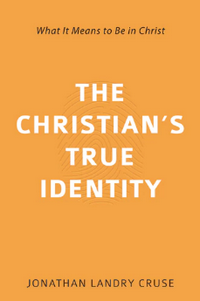Okay, I’m too tired to get something new ready. So instead of talking about Jonathan Landry Cruse’s newest book, let’s take a look at his previous one.
 |
The Christian’s True Identity:
|

Many of us are raised believing that Jesus is simply the way to salvation. But no—He is salvation. He is the way, but He is also the life! He is both the giver and the gift. He is not a means to an end; He is the end. We are not to come to Christ looking for Him to give us something (like salvation, sanctification, a better life—or at least a better car), but instead we are to come to Christ looking for Him.
What’s The Christian’s True Identity About?
I’ve spent too much time trying to be clever or profound with this, it’s a short book, I can be brief here. The book’s point is pretty simple—despite all the noise and hubbub today about finding ourselves, choosing/shaping our identity. For the Christian, our identity comes from being rooted in Christ.
One of the—possibly the—greatest truths recovered by the Reformation was that union with Christ is at the core of all the blessings, all the amazing things that are true of the Christian, the Christian Life, and the Life of the World to Come. It’s all rooted and grounded in Him.
John calls it “abiding in” Christ. Paul repeatedly describes our blessings “in Him.” Cruse looks at ten passages from Paul’s epistles where he uses the phrase “in Him,” reviewing the passage, explaining how the passage reflects and teaches this truth about Christian identity, and applying it to the reader.
So, what did I think about The Christian’s True Identity?
Throughout this book we have considered how an identity in Christ far excels any identity the world might offer us. When we are in Christ we are chosen, forgiven, accepted as righteous, adopted into God’s family, placed in community, made new, and kept perfectly secure come what may. Our blessings in Jesus Christ are so expansive that it can truly be said that our union began in eternity with election and will forever continue in eternity with glorification.
That’s pretty much what’s covered in the book—done effectively, warmly, and clearly. Cruse has an easy-to-read, engaging style—he’ll draw you in and make you want to learn more. He skillfully uses writers from throughout Church History, contemporary scholarship, and current cultural examples to help bring these truths to life.
I think it could be deeper, I think it could be more detailed. But that’s not what the book aimed for—it’s an introduction or a refresher, that’s all. It’s supposed to drive the reader to further study, further reading. It accomplishes that goal while pointing to glorious, foundational truths. I commend it to you for that.

This post contains an affiliate link. If you purchase from it, I will get a small commission at no additional cost to you. As always, opinions are my own.
![]()

